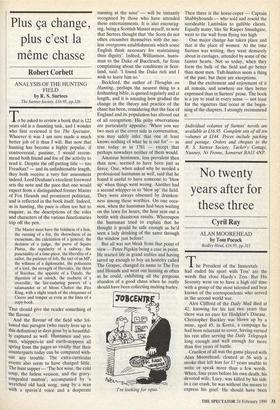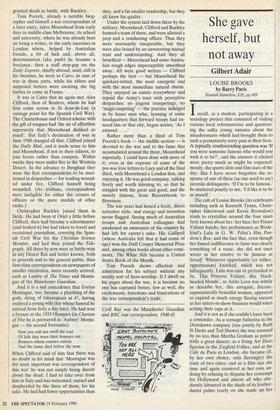No twenty years after for these three
Cyril Ray
ALAN MOOREHEAD by Tom Pocock Bodley Head, 176.95, pp.31I The President of the Immortals . . . had ended his sport with Tess' are the words that close Hardy's Tess. But His Serenity went on to have a high old time with a group of the most talented and best known of the correspondents who served in the second world war.
Alex Clifford of the Daily Mail died at 42, knowing for his last two years that there was no cure for Hodgkin's Disease, Christopher Buckley was blown up by a mine, aged 45, in Korea, a campaign he had been reluctant to cover, having earned his rest after serving the Daily Telegraph long enough and well enough for more than five years of battle.
Cruellest of all was the game played with Alan Moorehead, clouted at 56 with a stroke that left him for 17 years unable to write or speak more than a few words. When, four years before his own death, his devoted wife, Lucy, was killed by his side in a car crash, he was without the means to express his grief. He should have been granted death in battle, with Buckley.
Tom Pocock, already a notable biog- rapher and himself a war correspondent of a later entry, takes Moorehead from early days in middle-class Melbourne, its school and university, where he was already bent on being a writer, to the early successes in London where, helped by Australian friends, a bit of luck and, above all, determination (aka push) he became a freelance, then a staff stop-gap on the Daily Express, chiefly abroad, until, still in his twenties, he went to Cairo, in case of war in those parts, while his elders and supposed betters were awaiting the big battles to come in France.
It was in Cairo that he again met Alex Clifford, then of Reuters, whom he had first come across in St Jean-de-Luz (a vantage point for the Spanish Civil War). The Charterhouse and Oxford scholar with the gift of tongues had 'the air of effortless superiority that Moorehead disliked so much'. But Italy's declaration of war in June 1940 changed all that. Clifford joined the Daily Mail, and it made sense to him and Moorehead, if not to their editors, to join forces rather than compete. Within weeks they were under fire in the Western Desert. In the advance to Benghazi they were the first correspondents to be men- tioned in despatches — for tending wound- ed under fire, Clifford himself being wounded. (As civilians, correspondents were ineligible for either the crosses of officers or the mere medals of other ranks.) Christopher Buckley joined them in Sicily. He had been at Oriel a little before Clifford, then had become a schoolmaster (and looked it) but had taken to travel and occasional journalism, covering the Span- ish Civil War for the Christian Science Monitor, and had then joined the Tele- graph. All three by now were as battle-wise as any Desert Rat and better known, both to generals and to the general public, than first-class correspondents on newspapers of smaller circulation, more recently arrived, such as Lumby of The Times and Monta- gue of the Manchester Guardian.
And it is a sad coincidence that Evelyn Montague, too, became a plaything of the gods, dying of tuberculosis at 47, having outlived a young wife (for whose funeral he arrived from Italy a day late). He had won a bronze at the 1924 Olympics (in Chariots of Fire he is portrayed as 'Aubrey' Monta- gue — his second forename):
Now you will not swell the rout Of lads that wore their honours out. Runners whom renown outran And the name died before the man.
When Clifford said of him that there was no doubt in his mind that 'Montague was the most important war correspondent of this war' he was not simply being decent about the dead. I had to take over from him in Italy and was welcomed, nursed and shepherded by the three of them, for his sake. He had had fewer opportunities than
they, and a far smaller readership, but they all knew his quality.
Under the system laid down there by the military, Moorehead, Clifford and Buckley formed a team of three, and were allotted a jeep and a conducting officer. Thus they were necessarily inseparable, but they were also bound by an unwavering mutual trust and understanding. And they all benefited — Moorehead had some Austra- lian rough edges imperceptibly smoothed away. All were good writers — Clifford perhaps the best — but Moorehead the quickest-witted, the most energetic and with the most immediate natural charm. They enjoyed an entrée everywhere and repaid the Army's trust with perceptive despatches: no jingoist trumpetings, no 'magic-carpeting' — the practice indulged in by lesser men who, learning at some headquarters that forward troops had en- tered this or that city, began stories, 'As I entered. . .
Rather more than a third of Tom Pocock's book — the middle section — is devoted to the war and to the fame that accumulated around the three, Moorehead especially. I could have done with more of it, even at the expense of some of the pre-war love letters to Lucy and of the final third, with Moorehead a London lion, and enjoying it. He was good company, talking freely and worth listening to, so that he mingled with the great and good, and the merely famous, from Beaverbrook to Berenson.
The war years had honed a lively, direct narrative style, and energy and invention never flagged. Seeing much of Australian troops and Australian colleagues had awakened an awareness of the country he had left for career's sake. His Gallipoli (where Australia felt that it had come of age) won the Duff Cooper Memorial Prize and, among other books about other conti- nents, The White Nile became a United States Book of the Month.
Tom Pocock shows affection and admiration for his subject without any mushy sort of hero-worship. If! dwell on his pages about the war, it is because no one has captured better, few as well, the excitements, boredoms and frustrations of the war correspondent's trade.
Cyril Ray was the Manchester Guardian and BBC war correspondent, 1940-45.



















































 Previous page
Previous page